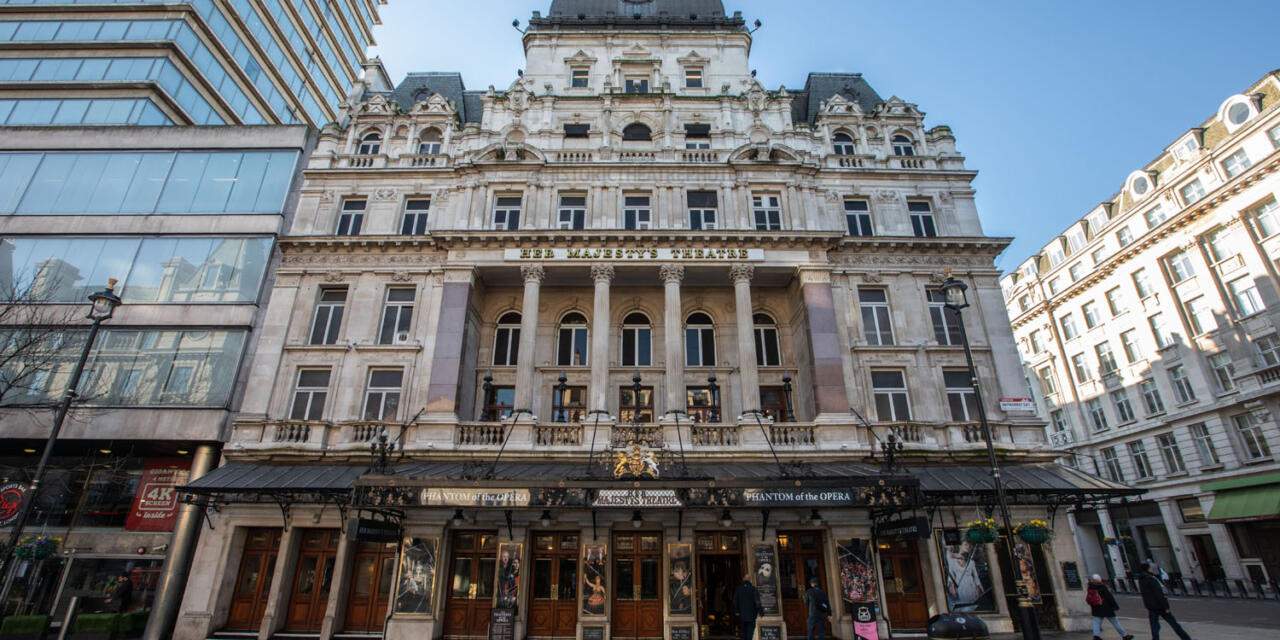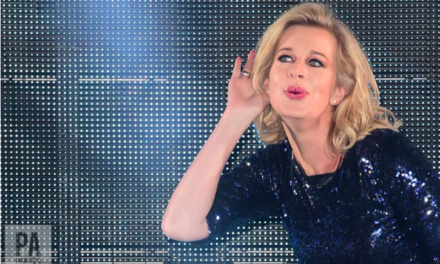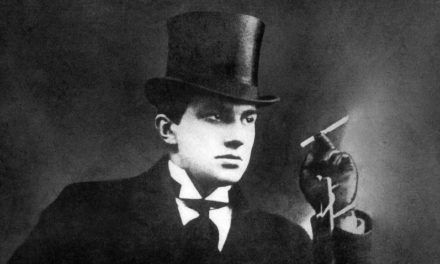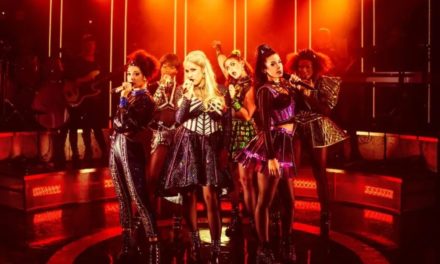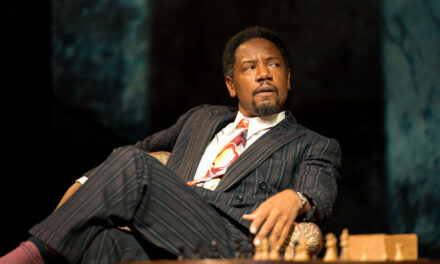Аn Exclusive Interview with James Paterson who was part of the original cast of the legendary musical The Phantom of the Opera, later on, the resident director at Her Majesty’s Theatre on West End for 10 years straight, one of the respectable Phantoms. James, also a musical theatre and vocal instructor, gave an exclusive interview to his former student – Lisa Monde, dedicated to the 35th anniversary of the musical.
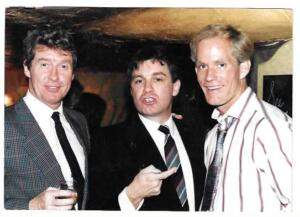
Group Shot – Michael Crawford (L), James Paterson (M) and Steve Barton (R) attend a cast party, Photo Credit – Marcus Taylor, from Mr. Paterson’s personal archive.
Lisa Monde: So, The Phantom of the Opera is officially closing on Broadway after 35 years of great success. It seems surreal, Phantom is something that I grew up with. I know that on West End Phantom closed before COVID and then came back?
James Paterson: Yes, it is back. Phantom premiered on the West End in 1986, a year before it did on Broadway. Who knew that it was going to run for 37 years! Let’s face it, the set is only made of canvas, metal, wood and paint, quite old, some parts in need of repair and probably quite dangerous. They had built a new touring version of the show which had opened at the Curve Theatre in Leicester when the COVID lockdown struck. This, I think, brought about the perfect opportunity to fix the problems at Her Majesty’s Theatre. The solution was to scrap the original set and install the new touring set. It was designed to look like Maria Björnson’s original set and, presumably, the production is likewise…
LM: But those changes were mainly about the set and the look of it, rather than the show itself?
JP: I presume so. My association with Phantom ended early in the 2000’s, so I wasn’t involved thereafter. I know the show will have changed, things do change. But I think I’ve decided that I’m going to remember the experience that I had in the original production of Phantom. And having worked on it so much, including playing the title role for a fair bit – I think I’ll keep my fond memories.
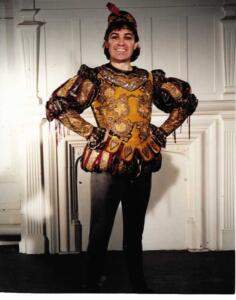
James Paterson as Passarino – Courtesy of James Paterson, from the personal archive.
LM: In the original cast you played Passarino and Don Attilio. How did you move on to being the Phantom himself?
JP: It all began at the end of a week when we had a few illnesses in the company. As a precaution, I was asked to quickly learn the part of André over the weekend. I gave my first performance as André on the following Tuesday, when Michael Crawford was taken into hospital, Steve Barton, our original Raoul, moved into the title role, and our André moved up to play Raoul.
Steve’s drop down the trap at the end of Masquerade went badly and he was taken into hospital the next day. Michael returned immediately and having only recently been appointed as Phantom 2nd cover, and not yet started rehearsals, I was given a seat in the stalls to watch and told to attend a rehearsal the next afternoon. I arrived for the rehearsal only to discover both Steve and Michael were now back in hospital and that left only me! I did three and a half weeks as Phantom till Michael was fully recovered. That happened way back in 1987.
LM: If you had to compare the West End production and the Broadway production of the show, how different would you say they are? I remember how I saw the West End production back in the 90s and it was my very first time seeing Phantom on stage. I was completely blown away. That was the best production of Phantom that I’ve seen. Later on, when I came to New York, I went to see the Broadway production. And I am going to see it again right before it closes in April. But I have to say that I favored the London production! Broadway is amazing, of course, there’s nothing like it! But to me – I hold the fond memories of the West End production.
JP: I saw the Broadway production in June 2000. A four day 50th birthday trip for my wife and I. We were born 3 days apart! I was still looking after the show in London and the office arranged for me to go see the show on Broadway. So, I went to the stage door, met the company manager, and he mentioned that somebody in the office wanted to see me. And it was Hal Prince, because Hal lived in New York and I understand went to the show regularly, and I don’t know if he came especially to meet me or he just happened to be in that day, but we had a lovely chat. Of course, the show was sold out completely, they couldn’t get seats for us so we sat on the two steps, the “Hal Prince steps” where when he would just pop in, he would sit to watch the show. And I only watched Act 1 as we had arranged to meet friends and go see, I think it might have been, Kiss Me Kate, that evening. So, I had only time to see Act 1. But even in that one act I could see how different it was. And I remember, the next time Hal came to London, I said “We have to have a chat, because I was shocked that there were so many things that were different”. He didn’t have time to have a conversation then, but he said “Look, Jimmy, we’ll talk later, but Broadway is Broadway, America is America, New York is New York – the people are different compared to the people in London”, and I never got any more than that. But Hal was aware of the differences obviously – he started it, he created it, and I couldn’t understand why he made those changes in the show. He was going to tell me, but it never happened and, sadly, now it won’t. But I was quite astonished at some of the subtle differences. Working on the show from the very beginning, I remember almost every word that he uttered about it, and I saw contradictions to what he had said originally. And, like you, I much prefer what we had in London.
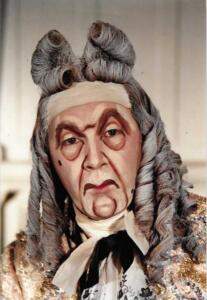
James Paterson as Don Attilio – Courtesy of James Paterson, from the personal archive.
LM: What were some of the major differences that you’ve noticed?
JP: Well, first of all, the Auction Scene – our Auction in London, as you remember probably, since you saw the show, was so much slower than it was in New York. It felt rushed in New York, like it would be at a typical Auction House. But when we did it, we did it terribly slow – everybody moved slowly, everybody spoke slowly, when they would gesture and bring up a number, it was also slow and, at the time, Hal used the term – “oil-damped”. He wanted us to create an “underwater feel” about it. And I felt that I couldn’t understand why it was going so fast on Broadway – give us time! I felt like we didn’t have time to establish that this old guy in the wheelchair was Raoul and so on, I didn’t understand that really. But I wanted to discuss this with Hal more, later. Do you know the film Citizen Kane? The black and white film. Anyway, the opening of Citizen Kane is all misty, mysterious and slow and Hal used that as an analogy for what we were doing in the auction. I didn’t see that in New York.
The other thing was, in the Manager Scenes in the Moonwalk – you know what I mean by the Moonwalk? We call it that as this was Gillian Lynne’s term for it – it is when the Phantom reads the letters and they all meander listening to it.
We took it very seriously in London, but in New York – when Phantom mentioned Carlotta – she was pulling faces and reacting to what he said about her and deliberately making the audience laugh. And I thought – “this isn’t about humor”. I also felt that the cast didn’t seem to be aware that they weren’t on the stage of the Paris Opera House, they were on the stage of the theatre they happen to be in – but dramatically the situation is that they are in the Manager’s office, and they hear a voice, but they don’t know where it’s coming from. And the Broadway cast seemed to be looking out front as if the Phantom was out in that auditorium of the Majestic Theatre. I so wanted to say – “Look, guys, he’s not out there in the auditorium, he’s in the ether somewhere.” I didn’t like the humor coming into it because it kind of weakened and inhibited the dramatic journey that leads to the Don Juan Scene where everything goes up in the air, they lock all the doors, now is the moment when they can stop all these killings and catch the Phantom: this whole journey that drives us rapidly towards that and I felt that the humor diluted that. There is humor in it, though, of course there is. There’s humor for instance in Hannibal when you look at Piangi and he has to leave the stage following Carlotta like her lapdog. There are places where humor already exists. But I think trying to generally invent humor there is a risk of losing the perspective of the whole thing. And again, I’d love if Hal could have explained it, but it didn’t happen.
LM: It is interesting that even though Hal didn’t get a chance to answer this question, he did say that he was taking into account the New York audience. And the New York audience and the London audience – are very different. It was hard for me to put into words that difference between what I saw on West End and then what I saw on Broadway. It felt like two completely different shows, and I knew that I preferred the London show. But now that you’ve explained it to me, I also think that the words that I would use to describe it – would be that the show that I saw on West End was very crisp and clear dramatically. It was very well paced. And on Broadway a lot of moments were kind of muddled in a way because they lost that drama there and decided to play and make it more into a comedy. It was interesting. I wonder if you’ve seen him on stage when you came to New York to see the show… but I spoke to an actor whose name is Kenneth Kantor and he’s been playing the two managers on and off throughout the production on Broadway. And he did work with Hal Prince when Hal was in New York working on Phantom…
JP: I probably did see him. One thing I do know about the Managers in the Broadway production… You know how the American people in theatre have tenure and we don’t have that here? Hal explained to me that he felt a change was needed, so he came up with the idea that the managers should switch roles. With André playing Firmin and Firmin playing André! An interesting challenge for the actors as the roles are totally different. I imagine Ken might have been involved in that switch?
LM: What was interesting, Ken kept saying that in the Broadway production – one of the things that they’re really proud of is that whoever comes into the cast for whichever role including Phantom, are allowed to explore. They have certain limitations, they have the parameters that they have to stay within – but at the same time, they really allow actors to create new characters. He also mentioned several times that all the Phantoms were very different. To me it was strange to hear, because from what I know, usually when a person comes into a show, especially for a title role, he or she is told to emulate the performer who originated the role or played the role before them as much as possible. You kind of follow in the footsteps of the person that came before you. But what I kept hearing from people on the Broadway production, was that each performer was very different. So, in your experience, when you were playing Phantom, how did you prepare for the role? And how was your Phantom different from Michael Crawford’s Phantom?
JP: I really had to think about this answer. I’m sure you’re aware of the Scottish bard – Robert Burns. I am very fond of Burns, I love the songs written to his lyrics and all his writing. He said:
O, wad some Power the giftie gie us
To see oursels as others see us!
He basically says “Wouldn’t it be great if someone could enable us to see ourselves as other people see us.” As far as my Phantom is concerned, I only know my Phantom from the inside, because I’ve never been able to step into the auditorium and see myself play it. I can only imagine. I hate listening to the recordings of myself and I imagine I probably would have been very critical about watching myself.
Whatever I did as Phantom, it is based on what I saw happening between Hal and Michael Crawford. I would try to do what I witnessed them do and how it came out is impossible for me to judge. But the one thing I do remember Hal saying was in his talk to us, even on the first day, before we started – he pointed out that there are many movies out there and a lot of them are very two-dimensional horror movies, but he said – “In this show – the Andrew Lloyd Webber show, that you are going to do – Phantom is a man, a human being with feelings and he is just isolated because of the society of that time.” And because of his deformity or disability, whatever you want to call it. It wasn’t acceptable to the common people at that time, so he had to hide away. But there is no doubt he is intelligent, in many ways. He’s an architect, he’s a composer, as Madame Giry says herself. He’s an intelligent man but he has feelings. And it’s only at the climax of the show when Christine kisses him, that his humanity and his compassion come to the surface, and he lets the two lovers go. You can take a lot from that. This man lives sixteen floors below everybody else, he finds ways to come out and spy, and enjoy culture, enjoy music, enjoy society, but by only looking in on it, not being part of it. He enjoys all of that, he sees something in this girl and he trains her secretly and admires her and, of course, falls in love with her. But in the end, she shows him a bit of compassion for the first time in his life, because he says in the last scene “The world showed no compassion to me” and then Christine, this beautiful, young girl kisses him. Big thing! Big moment! A brilliant climax to the story. That kiss was the turning point, it awakens his humanity. So that to me was the basis – you are playing a real person who lives under these cruel circumstances, but his humanity can rise. He’s killed people but there is also goodness there. And I always tried to play it from that.
I remember I had one exclusive rehearsal with Hal. Later, after I’d first been on, he saw one of my performances and the next day he called a rehearsal – I had a whole morning with him which was a great privilege. But we had a power cut. So, Hal said we’d just sit and talk. We sat on stage in emergency working light. It was nice and dark, appropriate atmosphere. So, we stayed there until the power returned. We were talking about the mask in particular. The fact that Christine, as you know, rips it off his face and he just loses it – it’s like he’s lost his safety belt, his comfort blanket. He falls apart and goes mad and even collapses to the floor, but when he crawls across the stage to her, I always think like a guilty dog with its tail between its legs and she gives it back to him– he puts it on and immediately becomes strong and upright. We talked about how important it was that the second the mask comes off – his hand goes immediately to his face, the face he has impulsively learned to hide. I remember saying to Hal “It’s like if someone slashes your face, blood instantly comes to the wound…”, and Hal said – “That’s exactly it!”. And I’ve never forgotten how good it felt to have him confirm my understanding with that suggestion.
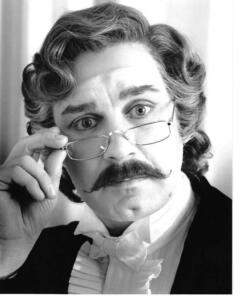
James Paterson as Monsieur André – Photo Credit – Marcus Taylor, from Mr. Paterson’s personal archive.
LM: Was the mask ever a hindrance?
JP: You know, when you get your costume as an actor – put it on and it takes you somewhere else. And the mask is very much part of that. The mask is more than that – you can not really become Phantom without it. Once you’re in the suit and the mask goes on – that’s it. And if you take the mask off – you’re not him and you can’t be him without it.
I think, all of these things are what I learned and remember most about him at the beginning and hope I have passed on to each new Phantom I have taught throughout the years.
Now, as far as you’re saying, that in New York they allow them to add something of themselves into it… Yes, it’s wonderful if an actor can find something of themselves in a character, you want to do that, but as a resident director your job is to maintain what was originally created. That’s what I’ve always tried to do. Keeping the production, the composition of the production as it was originally, making sure the lighting is all the same, and to some extent, trying to see that the momentum and the drama that comes from each new cast member achieves the same intention.
I remember actually, there were two American Phantoms that came during my time…
LM: Were you able to find some place at the theatre where you could prepare for the show? Hide from everyone else, find the atmosphere for inspiration?
JP: Her Majesty’s actually has three floors below the stage, that’s why in Her Majesty’s you have those huge pieces of set coming out of the floor.
LM: They did the same at the Majestic Theatre. Which is rare. Usually, there isn’t much space under the stage. But because of all the set pieces for Phantom they had to rip out everything that was under the stage and create space for the set. However, there was no space left for actors to use backstage… It was just enough for the set to fit.
JP: Well, at Her Majesty’s we had three floors below the stage. And in fact, I used to do guided tours of the building sometimes. I would take people down to the bowels to see it. And, of course, the original Victorian wooden machinery was there – it was put safely aside so it could be restored later. (Presumably, when Phantom finally closes) Most of the new stuff was made of metal. I went down there, didn’t spend much time there – it was a bit dirty, to be honest. But the Phantom’s dressing room consisted of a lounge, a makeup room and a shower room. I got quite a surprise once, when one of the two American actors who came to play Phantom in London, asked for all the furniture to be removed from his dressing room. He just wanted a stand for his clothes and a chair to sit in. There was a separate room where all the makeup was done and a shower room and so on. But the large part of his dressing room furniture was all taken away, as he required. Me, personally, I would want the comfort, to be able to rest, to have a recliner chair – to be able to sleep in between the shows. There was another Phantom, I never saw it happen, but I’m told that he would ask for one of the ushers to bring him a bucket of ice and he would dip his hands in the ice before he went on…The Method, I think they call it… I never actually tried anything like that.
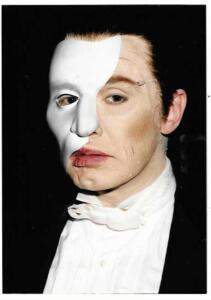
James Paterson as Phantom – Photo Credit by Rafael, Courtesy of James Paterson, from the personal archive.
LM: Let’s get back to Phantom. It is interesting – you’ve mentioned that Phantom is first of all a human being, simply a man. I remember when I read the original novel by Gaston Leroux – in the novel, Phantom is more evil, he is the villain of the story and in the musical – he is not the villain, he is the suffering monster who fell in love and is a human being through and through. In some ways, more than all the other characters.
JP: I feel that in this specific version of the character – what’s on the face is essentially what it’s all about. And it’s great that somebody took the trouble to design something that became, I was going to say – a fantastic prop, but it’s more than a prop – it’s attached to you. You hear people talk sometimes about getting the right prop – it’s an extension of the character in a way.
LM: You’ve told me about your predecessors and followers as Phantoms… I guess my next question would be- do you have an “ideal” for Phantom, that you consider to be the best Phantom on West End?
JP: Probably, if I ever got a chance to buy a ticket, knowing nothing of what I was going to see, Phantom would have had the same tremendous effect on me as it had on you. I watched Phantom come to life from the pages of the script and score, if you like. And judging the show honestly, as to how it impressed me as a viewer, as a member of an audience – I am at a disadvantage – I can’t judge Phantoms. There’s never going to be one Phantom that’s absolutely perfect for me. You’ve asked which was one Phantom that was my ideal in a professional sense – that’s quite an easy one to answer – Michael Crawford, no doubt.
I watched Michael a lot – I used to always think “That man knows what he’s doing, he knows how to achieve it and do it every time”. You know, his make-up session used to start 2 hours before every show – 5 o’clock for an evening and midday on a matinee. And he always went on to the stage for a microphone check just before they opened the house to let the audience in. He never left his dressing room to do that without the mask on – because he knew how important it was to save that moment for The Point of No Return where it’s revealed. That was a clever way of maintaining and building the drama of it all. After he went, hardly any Phantom did that. I agreed with him about saving that reveal and always wore the mask when I left the dressing room.
I know the show has changed over time and I have to accept that things will change – but I’m glad I was there at the beginning, and I do think that Crawford helped create much of the character.
LM: Makes sense. What about Christine? Did you have a favorite Christine over the years?
JP: I will always be very grateful to Claire Moore, who was the original alternate to Sarah Brightman. Sarah only did the first six months and Claire had already taken over the role when I first went on. She is probably the same height as me, if not slightly taller, and I, of course, not having a costume wore Michael’s, but needed to have a couple of inches taken off his trousers. The costume pretty much fit me, as did his prosthetics. Claire helped me all through it, absolutely, but also did one truly wonderful thing – you may remember that in the dressing room Christine takes off her ballet flats as she’s been dancing in Hannibal and puts on character shoes with a bit of a heel along with a negligee, which allows her to walk around the following Lair Scene more elegantly. Claire decided to keep the ballet flats on. She did that for the whole scene and it was of course extremely helpful to me in my first appearance. She is a dear friend. She was also very special as Christine. Then – Jill Washington, who was also in the original show as I was – she wasn’t even Christine cover then, she played one of the Princesses in Hannibal. But she later became a Christine and played the role for several years – I liked what Jill did very much. I loved her voice and the gentle, naive way she played the role. So, Claire and Jill were probably my favorites. See? It’s easier for me to talk about the Christines!
LM: I’ve been told, that at the Majestic Theatre, there was a tradition that got carried out through the years of the show’s existence – backstage there are frames with pictures of all the actors that have ever done Phantom. Was there anything of that sort in your cast on West End, at Her Majesty’s Theatre?
JP: I don’t think so. Up in the dome of Her Majesty’s – there’s a large space, where the famous actor – Sir Herbert Beerbohm Tree, who used to manage the theatre for many years and directed and acted in many productions – he lived up there. The dome has a big archway in the middle of it dividing it into two large rooms. There are old photographs of the space as it was in Beerbohm Tree’s time with two enormous oak doors, now gone. These doors would have separated the room where he slept, from the other one which would be an office. In these pictures we can see that this dividing wall was decorated with lots of stags’ heads, hunting trophies. We’ve had a few parties up there and I’ve decorated these rooms on occasions.
My history, by the way, is that I didn’t go to drama school, I went to art school. I studied textile design at the Glasgow School of Art. And I taught art for one year before I went into Scottish Opera. While studying at the Art School, I took singing lessons, privately with a teacher at the Royal Scottish Academy of Music. So… I decorated that room in the dome a couple of times at Her Majesty’s Theatre. And one year, I thought it might be fun to take inspiration from these pictures of the original room. So I made several sets of papier mâché antlers with a space in the middle where I put headshots of our sixteen Phantoms to date. I then cut out sixteen white masks and stuck them on the faces. Part of the fun for people at the party was to try and identify all those sixteen Phantoms. Those were the people who played, understudied, in any case, played the role at one point or the other. I don’t remember which year that was but at that time there were sixteen images under the masks of Phantom with antlers sticking from their heads. Trophies!
LM: Sounds fantastic and very creative. So, back to the Phantoms. I don’t know if you’re aware but our current Phantom on Broadway right now, who is about to be closing the show – his name is Ben Crawford.
JP: Well, that’s a funny coincidence. Opened by Michael Crawford and closed by Ben Crawford.
LM: Will there be anything created to commemorate the fact that Phantom ran at Her Majesty’s Theatre for so many years in the end?
JP: Well, again, I’ve heard no talk of closing the show. In fact, I heard recently that they were recasting it. The thing is, this show is precious to me. And I would want to hang on to it. It’s a bit like when I went to Vienna, to Mozart’s House and I was disappointed somewhat, because there’s hardly anything in his house now that was there when he lived there – and I said to my wife – “Isn’t that sad? There are bits of furniture, but they are not his, there’s nothing of him left…” But then I realized what’s more important than any of that – we have all his music.
As far as Phantom is concerned, I’ve got my memories of the original cast and the original production. That’s the only memorial one could wish for or hope for, really. I’ve been very privileged that after being up in Scotland and singing with Scottish Opera for about ten years, the first job that I get on my transition from opera, then coming to London was to be in the original cast of Phantom – which turned out to be one of the most successful and iconic musicals and roles ever. Who would have thought? And also, my memories are very detailed. (laughs)
LM: Did you read the novel before becoming Phantom?
JP: I did, of course, read the original novel by Gaston Leroux the moment I knew I was going to be doing the show, and the first thing I noticed right away – obviously, it was a translation. I don’t think the flow of the language quite worked in English. Although I did French at school, I wouldn’t be able to read the book in the original. Like all pieces of art – they come from other pieces of art or nature. A bit like Pigmalion and My Fair Lady. The book and the musical are not the same. In the book it is suggested that Phantom is quite grotesque and frightening. Lloyd Webber saw it a bit more romantically, I think. And Hal Prince recognized that. We have to remember that the show has its own new starting point. The most important thing for me was the production’s point of view, in design particularly, as a piece for the theatre. The book was an inspiration and that’s about it. When we had the 25th anniversary tour of the show here, my son, Richard was swing-tech on that tour and became Stage Manager. I went to see the show in Bristol. The Phantom on that tour was John Owen-Jones. He had played the role at Her Majesty’s, and Valjean in Les Miserables, both in London and on Broadway, you may know him? He is one of the best Phantoms, I think, both dramatically and vocally. He said to my son – “I don’t think your dad should come!” The concept and design and production were so different – I had a horrific night watching it. Most upsettingly, it was billed as having Maria Björnson’s original costumes, BUT, someone had dared to alter them, adding extra fabric, removing parts and accessories etc! It was like taking Van Gogh’s Sunflowers and deciding to make the petals purple!
The original show of Phantom in Production and Design is an iconic piece of Art and it should not be interfered with! Make new ones if you must, but leave the original be!
LM: There was also a sequel to the original musical – called Love Never Dies, based on the book by Frederick Forsyth Phantom of Manhattan. Have you seen it?
JP: Yes, I saw it in London. The start of it made me sit on the edge of my seat. I know it’s changed a lot and apparently there was an Australian production that was so much better. I’ve seen that on the video. But I sat on the edge of my seat when Madame Giry started her aria on the pier at Coney Island. That drew me in, but shortly after that I thought – so many things didn’t work. What really bothered me was the Phantom taking his own mask off and frightening his supposed child. The Phantom I knew would never have done that. And I don’t quite understand why Andrew would do it. Perhaps I should have reminded myself that it was a new story, a new show and a new and independent piece? But I found it difficult to give it fresh eyes. It destroyed the Phantom that I was familiar with.
LM: You’ve played Phantom and so many other roles in the show over the years. Would you say that Phantom has been favorable to you?
JP: I would have to say so. Phantom – was my trip to London. I love Scotland very much, but my two sons live down here now and I’ve got a granddaughter who was born here and we’ll probably stay here now, in the South. Initially, I came to London temporarily to play Leporello in Don Giovanni and during that time I got cast in Phantom. So, it was my trip south, it opened my theatrical world so much more, I got an agent. I found out more about the commercial side of things as opposed to the Opera World. It opened up so many other opportunities for me. But also the apprenticeship that I paid – ten years or so that I was involved with the show – I gained such a lot of knowledge and information about theatre and about myself. It has been the most significant part of my career. I’ve got very fond memories. And I’m sure you’ve got the flavor of the feelings that I have about the piece. But I also have some frustrations about it – not so good memories, and that’s why I’m not in a rush to see new versions of it…
LM: I wonder, did Phantom ever haunt your theatre? Did you ever blame some mishaps that happened during shows on Phantom?
JP: Only in my dreams. I think there is supposed to be something that goes around in Her Majesty’s. I’ve never seen anything. I know there are stories of ghosts in theatres. Like in Drury Lane Theatre and so on. But all I can say is, I’ve never been special enough to be graced with a visit or a sighting.
LM: Any stories about things going awry during the show? I love hearing those. Anything that happened at certain point that was not supposed to happen, but you got through it anyway?
JP: There was one night when the chandelier never left the stage after all the cloths for Hannibal had risen during the Overture and Carlotta was just about to come forward to sing. The chandelier was still lying on the stage. So, we had to stop and it created quite a stir, because Rosie Ash, who was the original Carlotta, peaked cheekily from behind the chandelier, waiting to come forward to sing. There was an uproar and we began again from the top of Hannibal.
In one of my early performances, you know how the boat moves in the Lair Scene – it is controlled remotely by the stage manager in the wing and after Phantom brings Christine out of it down stage right and then brings her across and he places her center stage and he is supposed to back up… but Claire Moore, on this particular night, wouldn’t let go of my hand – she kept hold of me and she was still singing. I started to wonder what was going on, and I turned and noticed that the boat hadn’t made its complete turn into the central position where it becomes the bed. It had gone too far and got stuck, just slightly over the edge of the stage. And if I had gone back, I would have fallen over. So, I went over and grabbed the boat by the hook at the front that held a lantern and swept it around back into position. And then we carried on. It’s always interesting that when something goes wrong you find that you can act spontaneously and instinctively. A lot of people didn’t even realize that something had gone wrong. The minute I came off stage after the scene ended, I learned that it was one of the ASMs – she had been practicing with the boat that day and during the show she might have gotten a bit nervous, so she came to me and profusely apologized. It’s live theatre!
Once, the staircase in Masquerade got stuck during the change from the Corridor Scene for the next scene in the manager’s office. It should have been pushed up stage where it collapses and folds up flat to hang against the back wall like a broken venetian blind, but for some reason, that one time it wouldn’t go back. So, we had to stop for a bit. I don’t blame the Phantom for that.
LM: I actually performed in a student production of the West Side Story by West End Ltd at Her Majesty’s Theatre years ago. I will never forget how they took me to Christine’s dressing room and then when we started rehearsals – I discovered that the stage wasn’t as big as it seemed and there was so little space in the wings. I remember when seeing Phantom from the audience first – the space felt so grand. It was such a treat to be able to experience Her Majesty’s Theatre on the stage and backstage and see how all of these things work. I think I felt the Phantom’s presence there.
JP: It’s interesting – Phantom for singers is like Cats for dancers – it’s at the top of the bucket list for everyone. I would have loved to see and hear you play Christine!
LM: I wouldn’t have said no, I would even consider playing Phantom himself! And I can promise you, my Phantom would have been very different – closer to the one in the novel, perhaps, definitely more mystical and animalistic. He is a trickster, after all. At least, that’s how I see him!
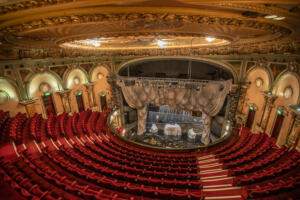
Balcony Right Her Majesty’s Theater. Photo Credit Historic Theatre Photos by Mike Hume (historictheatrephotos.com).
This post was written by the author in their personal capacity.The opinions expressed in this article are the author’s own and do not reflect the view of The Theatre Times, their staff or collaborators.
This post was written by Lisa Monde.
The views expressed here belong to the author and do not necessarily reflect our views and opinions.

